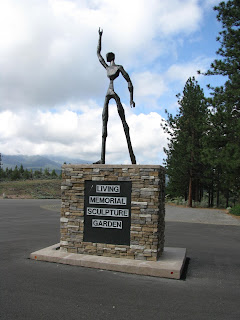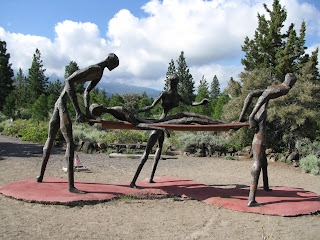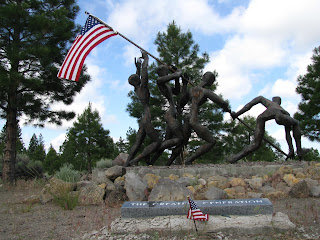Preached on Sunday, July 28, 2013
Scripture readings: Isaiah 49:8-16; I
Corinthians 5:1-23
 |
| Vacation: June 2013 Walking East of Live Oak, CA |
There is a glaring example of sin in the fifth
chapter of First Corinthians. It really seems too horrible to talk about it and
so I am not going to do it. I am not going to speak of it. Yet the presence of a
glaring sin in that church in Corinth
The normal Greek word for sin is an archery word that
essentially means missing the mark. It can mean overshooting, or undershooting,
or going wide of the mark to either side.
The sin in the church at Corinth
The glaring sin in the church in Corinth
 Actually Paul calls the lies something like slander;
and he calls the cheating something like swindling; but is there really any
difference? And how can lying (or slander) and cheating (or swindling) compare
with the truly outrageous?
Actually Paul calls the lies something like slander;
and he calls the cheating something like swindling; but is there really any
difference? And how can lying (or slander) and cheating (or swindling) compare
with the truly outrageous?
Have you ever told a lie? I have. How do you know that you never will
lie again; ever? Or, have you ever allowed anyone to remain seriously
uninformed? I have. Can you guarantee that you will never do that again? And
yet think of all the trouble it may cause if you don’t quietly leave that person
uninformed.
And what can you say about the condition of truth in
a world where everyone finds a socially compelling reason to tell a small lie
every now and then? And, then, who has any right to complain about the
condition of truth in our world? Who has the right to blame anyone?
I have no stomach to talk about the glaring sin in
the church at Corinth
I guess I could change the subject and talk about
greed and selfishness. But I wouldn’t be changing the subject. I would still be
talking about sin. Sin is sin.
On one hand, it seems to be so pessimistic, so
gloomy, so negative to lump such little sins together with such a glaring sin.
Yet, if we thought that all sin, by its very nature, was serious, then lumping
them together would be necessary.
We do this with other serious things. We do this with
cancer. There are big cancers and little cancers. There are cancers with good
odds of treatment, and cancers with less good odds of treatment.
When we’ve been around that kind of thing much, I
think we learn, as Christians, to deal with reports of cancer, or reports of
the possibility of cancer, carefully. We give it a balance of encouragement
founded in faith and concern founded in faith. We treat the big and the little
with careful seriousness.
 I had a small growth on my neck and my doctor said
she didn’t like the look of it, so she cut it out (a couple weeks ago) and sent
it in for a biopsy. The results turned out negative (which means no cancer). Spiritually,
mentally, emotionally, I dealt with my waiting period carefully and seriously. I
had about a week of wondering if my life was about to change, and just how much.
I wondered what I would be willing to do about it. I wondered if I would take
it seriously enough. Sure, I would take the treatments, but would I be willing
to change my daily life forever in order to deal with it?
I had a small growth on my neck and my doctor said
she didn’t like the look of it, so she cut it out (a couple weeks ago) and sent
it in for a biopsy. The results turned out negative (which means no cancer). Spiritually,
mentally, emotionally, I dealt with my waiting period carefully and seriously. I
had about a week of wondering if my life was about to change, and just how much.
I wondered what I would be willing to do about it. I wondered if I would take
it seriously enough. Sure, I would take the treatments, but would I be willing
to change my daily life forever in order to deal with it?
Paul was surprised that the people of Jesus who
formed the church at Corinth
I can never read about this pride without being
curious about it. Were they ignoring the glaring sin in their church? Were they
like ostriches hiding their heads in the sand? Were they thinking how modern
and accepting they were?
They were certainly living as if they were “not under
the law, but under grace”, which was the kind of thing that Paul often spoke
about. (Romans 6:14) By being proud they could claim that they were only
following the advice of Paul, himself. But Paul saw nothing of this in them.
 Paul could see that they didn’t understand sin, or
God’s law, or God’s grace because they didn’t understand God’s holiness. They
didn’t understand what it meant to be holy. “Holy” isn’t a word that Paul used
in the verses we have just read; but it is in his letters to the church in
Paul could see that they didn’t understand sin, or
God’s law, or God’s grace because they didn’t understand God’s holiness. They
didn’t understand what it meant to be holy. “Holy” isn’t a word that Paul used
in the verses we have just read; but it is in his letters to the church in
In the next chapter (the sixth chapter of this letter)
Paul gave us a picture of holiness. He wrote: “He who unites himself with the
Lord is one with him in spirit.” (1 Corinthians 6:17)
Sometimes holiness sort of means “being different”.
It doesn’t mean being strange, but different in a way that may not be very well
understood. It means crossing a boundary into a whole different way of life
that you could never have imagined before.
“He who unites himself with the Lord is one with him
in spirit.” This represents a huge step in the direction of not being single:
holiness means being in a relationship. Holiness is a partnership. It is being
a member of a team because of love.
 Holiness is like marriage, in which you become a new
person because you are joined, in the core of your being, to another person.
Holiness is the highest marriage, because it is like being married to God. The
Church, in fact, is called “the bride of Christ”. (Ephesians 5:16-18; 2
Corinthians 11:2-3; Revelations 21:2)
Holiness is like marriage, in which you become a new
person because you are joined, in the core of your being, to another person.
Holiness is the highest marriage, because it is like being married to God. The
Church, in fact, is called “the bride of Christ”. (Ephesians 5:16-18; 2
Corinthians 11:2-3; Revelations 21:2)
In the spirit of marriage, everything else falls into
a new place; or else the marriage doesn’t work because you, or your spouse, are
not diving into it. Someone has not completely surrendered to it.
I am not married in the conventional sense of the
word; but I am married to Christ, and I am (in some way) married to the church.
My marriage to Christ makes my life follow a different set of rules.
My being a Christian and my calling as a pastor to
the people of Jesus require that I relate to others, and even to myself, in a
way might not be very clearly understood by those who do not know Jesus, or what
Jesus may ask of those who have positions of responsibility in his church. But
this is true of every Christian.
The word “holiness” can make us think of a life
regulated by a lot of rules, and commandments, and expectations; but the rules
are really only the shape of the marriage without the spark of the marriage.
Holiness doesn’t even mean always being in harmony and total agreement with God.
Holiness means having in your relationship that you would never part with:
having something that just clicks and you wouldn’t have it any other way.
Holiness means having the instinct, or the motivation, or the love that is
required to be “one with the Lord in spirit”.

The glaring sin in the church at Corinth
We don’t know, for sure, if both the parties were
Christian. It seems clear that one of them was Christian. I simply think that
the one who was a Christian was held in a higher marriage to Jesus, and that
marriage that should have prevented that glaring sin.
I believe that we do not always listen to the spirit
of our marriage to Jesus in our other relationships. I believe that I can be
very superficial and shallow in my marriage to Jesus, and that is where I, and
my marriage, can certainly turn ugly. I make this beautiful thing, the good
news of Jesus, ugly, when I don’t live completely in the spirit of my marriage
wit him.
But that is not Paul’s greatest problem with the
church in Corinth
Even when Paul said to “expel” the man, it was not
for the purpose of getting rid of the man. It was for the purpose of getting
him back. In fact, the story of the glaring sin runs on into Paul’s second
letter to the church in Corinth

The problem is, how do you help someone who is
messing up their marriage to Jesus; this beautiful and holy thing? How do you
make them better?
In the world of the ancient church there was no other
place to find the people of Jesus but in the church. In the world of the
ancient church, going it alone was not an option. If you were married to Jesus,
and even if that marriage was messed up, you need the protection of the friends
of Jesus around you. You would miss the family of Jesus even if they were
giving you a time out.
The expulsion was nothing more than that. Even the
talk about delivering the man over to Satan doesn’t have to mean anything more
than what it is like to not have the protection of holy friendships.
A family can be like a little castle with walls and
towers, and so can the church, at its best. The only problem comes when the
castle’s safety tempts us to stay inside our walls. We are tempted to forget
God’s love for the whole world that he has made. We are tempted to forget his
purpose in Christ to reach out to the world he loves so much. The church at Corinth
At first, the church at Corinth Corinth Corinth
 When going it alone was not an option, expelling
people was the best way to love them when they were going wrong. It was, as I
said, like a time out. There was no real alternative.
When going it alone was not an option, expelling
people was the best way to love them when they were going wrong. It was, as I
said, like a time out. There was no real alternative.
There may be different ways today to effectively love
the people of Jesus when they are drifting into trouble, or into absence.
Ignoring them, or taking pride in ourselves, or not forgiving or comforting
them is no good solution. Holiness has rules, but true holiness also has a
spark. It has fire. It has a passion and a love that cannot turn the other way.
Paul doesn’t tell us who to judge and how to punish
them. That is not his purpose. He tells us to love them enough to find a way to
reach them and bring them back. If we don’t see this then we are very much in
danger of being like the church in Corinth
If we
are holy, if we are married to Jesus, we need to remember the wedding ring of
Jesus (which is not a ring, but a mark on his hands). It is like the mark of
God when he talks about being like a mother to us. “Can a mother forget the
baby at her breast and have no compassion on the child she has borne? Though she
may forget, I will not forget you! See, I have engraved you on the palms of my
hands.” (Isaiah 49:15-16)

I hate to say it (because I don’t like tattoos), but
it is as if the Lord has a tattoo on his hands, and it bears the name of every
soul and every life he loves. It is a pretty big tattoo, but God is infinite in
his love. Jesus is God, coming into the world with a compassion that will not
forget even one person that he loves. On the cross, with the points of nails,
the hands of God were marked with his love and compassion for us.
This is the mark of our marriage covenant to Jesus.
And the Lord says, “I will keep you and make you to be a covenant for the
people….to say to the captives, ‘Come out,’ and to those in darkness, ‘Be
free!” (Isaiah 49:8-9)
No one knows how to take sin seriously until they
know how to love seriously. Paul said, “Shouldn’t you rather have been filled
with grief?” (1 Corinthians 5:2) Paul really meant the grief you feel in
response to a death.
A long time ago in my ministry, I began to notice the
comforters who would come up to a person who had lost a loved one. The best
comforters were the people who knew a similar grief, a similar loss, of their
own.
They almost didn’t need to say anything. Their
presence was healing.
But I saw that, in comforting others, they were
reliving their own grief in their own quiet way. Time had given them
perspective in their loss and sorrow, but time did not give them forgetfulness.
Time had brought more of Jesus to them, but it was the Jesus of the cross and
the resurrection, and not a Jesus without wounds. But that is where healing and
salvation get their power and become, living things.
 It’s the same with the seriousness of sin. Our
effective and loving grief for the sins of others can only come from our own
experience of our own sins, and the wounding, and the dying, and the rising of
Jesus for each of us.
It’s the same with the seriousness of sin. Our
effective and loving grief for the sins of others can only come from our own
experience of our own sins, and the wounding, and the dying, and the rising of
Jesus for each of us.
Without that genuine grief and the love that comes
from it, we are dangerous. Without that grief and love, we are more dangerous
as people of faith than we would be without our faith. But, with the holiness
that is built upon love, when we are one with Jesus in spirit, we can find the
best and clearest way to say, “Come out! Be free!”





























